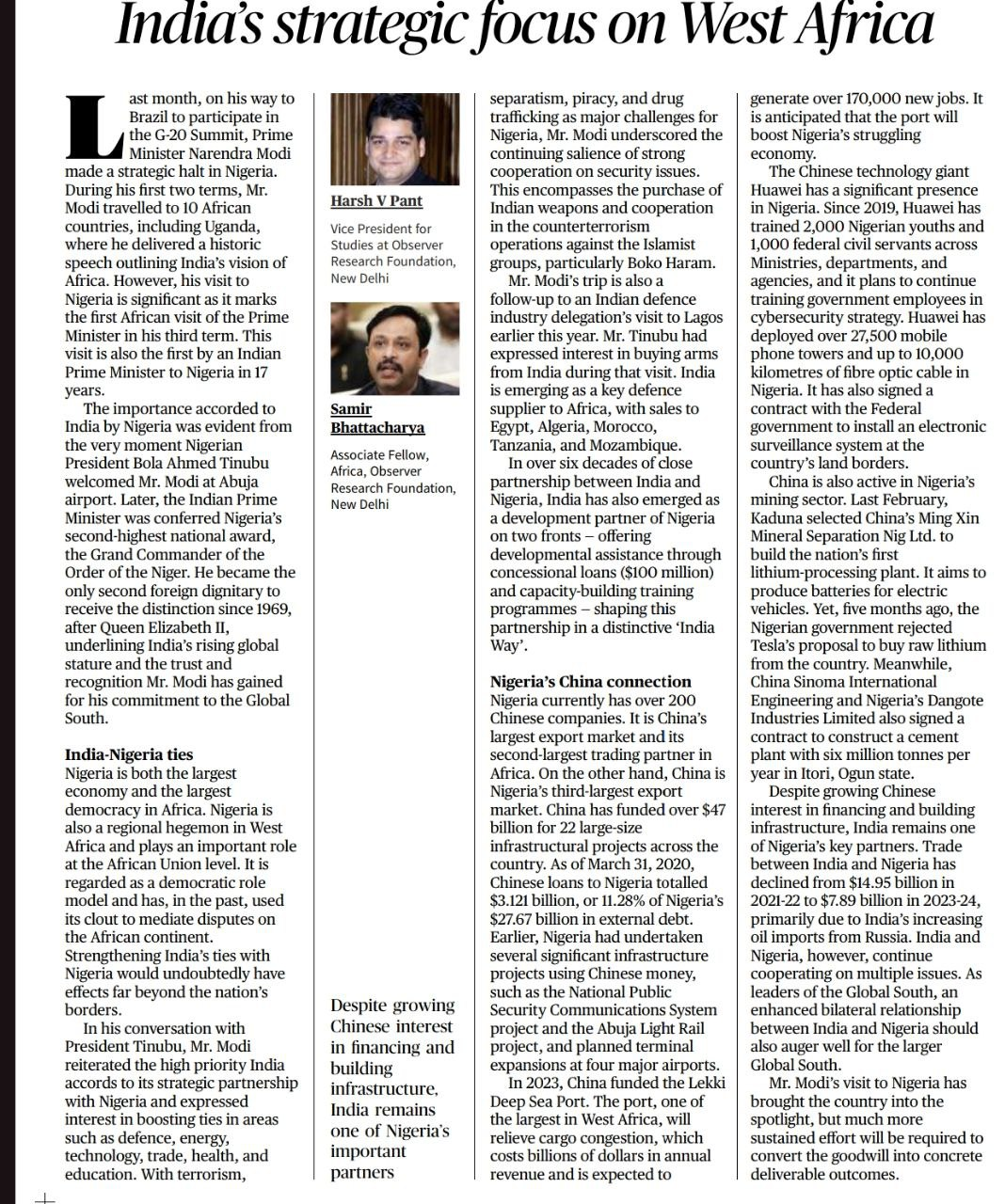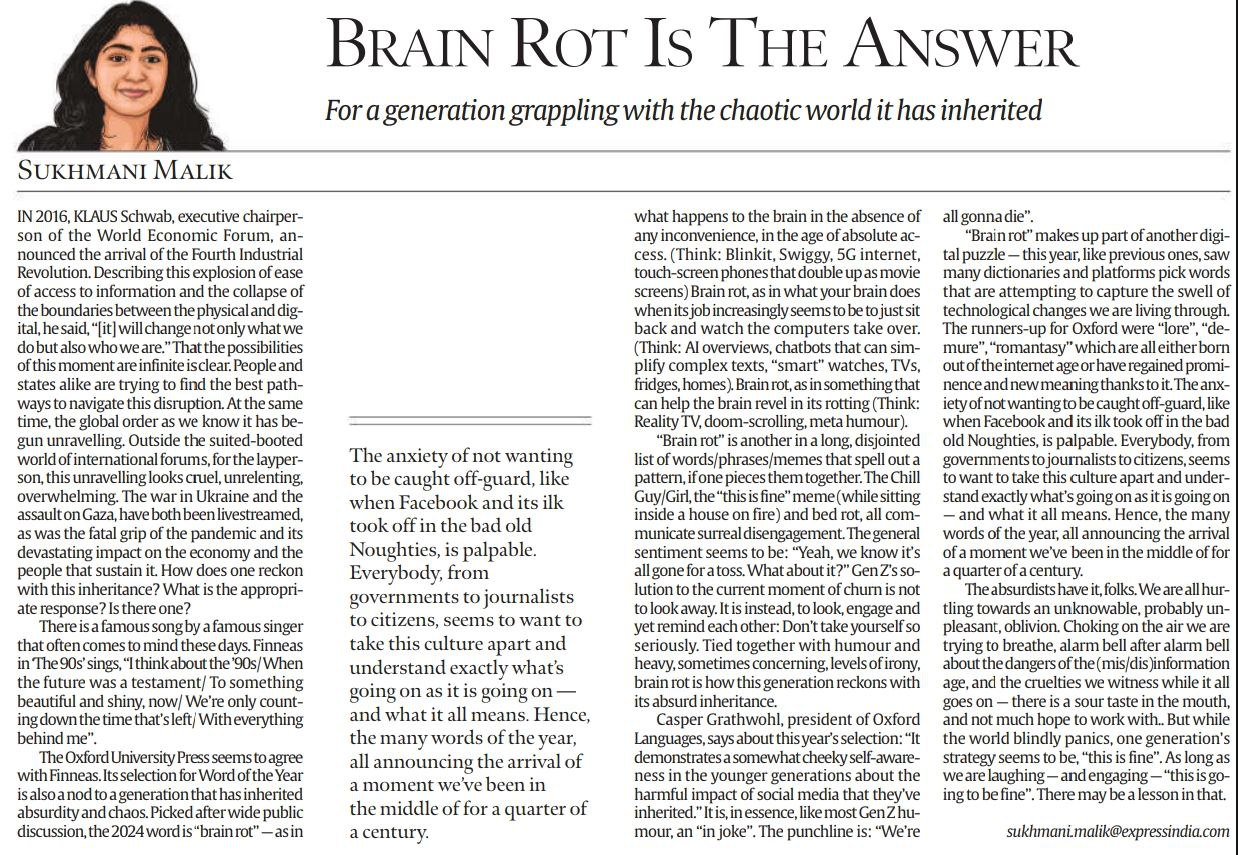1. India’s Strategic Focus on West Africa: Strengthening Ties with Nigeria
Introduction:
- Prime Minister Modi’s Visit: In his third term, PM Narendra Modi’s recent visit to Nigeria marks the first by an Indian Prime Minister in 17 years, emphasizing India’s growing focus on West Africa.
- Nigeria’s Importance: Nigeria is the largest economy and democracy in Africa, playing a critical role in the African Union and regional stability.
- Strategic Partnership Between India and Nigeria:
- Multisectoral Cooperation: India and Nigeria’s strategic partnership spans sectors like defense, technology, energy, trade, health, and education.
- High-Level Recognition: The Nigerian government conferred the Grand Commander of the Order of the Niger (GCNG) to PM Modi, one of the highest honors for foreign dignitaries.
- Global South and Development Focus:
- India’s Role in the Global South: Modi’s visit underscores India’s growing influence and commitment to the Global South, with India’s partnership seen as essential for Nigeria’s long-term development.
- China-Nigeria Trade Dynamics: China’s growing influence in Nigeria’s infrastructure and mining sectors has led to India facing trade challenges, with a decline in trade figures from $14.95 billion in 2021-22 to $7.89 billion in 2023-24.
- Key Areas of Cooperation:
- Cybersecurity and Technology: India’s focus on assisting Nigeria in cybersecurity training and technology infrastructure.
- Energy and Health: India’s continued role in supporting Nigeria’s health and energy sectors, key for long-term cooperation.
Conclusion:
- Reaffirming India-Nigeria Relations: Modi’s visit highlights the strengthening of India-Nigeria relations, with a focus on infrastructure, trade, and cybersecurity.
- Future Prospects: Continued efforts are necessary for converting strategic goodwill into concrete outcomes that benefit both countries.
Mains Practice Question
|
Q. Discuss the significance of India-Nigeria relations in the context of India’s growing engagement with West Africa. How can India leverage its strengths to strengthen this partnership further?
|
2. Brain Rot Is The Answer: The Challenge of a Chaotic Generation
Introduction:
- Technological Disruption: Klaus Schwab’s reference to the Fourth Industrial Revolution in 2016 highlighted the drastic changes in how we interact with information, technology, and the world. This revolution has blurred the lines between the physical and digital, leading to both opportunities and challenges.
- Global Unraveling: The world faces turmoil in the form of wars, economic crisis, and the lingering effects of the pandemic, making the response to this generation’s inherited chaos complex and urgent.
Brain Rot: A Cultural and Mental Condition:
- Definition of Brain Rot: In the digital age, “brain rot” refers to the mental and cultural fatigue caused by the overwhelming information flow and societal disarray. This is seen as an inability to engage deeply with life due to constant distractions.
- Examples of Symptoms: The popularity of digital tools, memes, and platforms that simplify complex tasks or emotions reflects this detachment. People are more inclined to disengage from deep thought and immerse themselves in fleeting, surface-level content.
The Global Mental State:
- Anxiety and Numbness: The phrase “brain rot” also captures the societal feeling of anxiety about being left behind, highlighted by rapid technological and cultural changes. The anxiety is widespread, not just among the youth but also across governments, journalists, and citizens.
- Generational Impact: The younger generation, especially, faces a profound existential crisis due to the overwhelming amount of change and instability. This generation is trying to make sense of the chaos while dealing with the fatigue of constant digital engagement.
The Philosophical and Sociological Implications:
- Cultural Analysis: The rise of phrases like “brain rot” and “this is fine” meme culture reflect a disillusionment with society’s fast pace and the inability to comprehend or address its complexities. There is a deeper feeling of resignation among individuals and groups who struggle to navigate an increasingly chaotic world.
- Call for Action: The article calls for individuals to remain engaged despite the overwhelming chaos, urging them to embrace humor, remain mentally engaged, and avoid succumbing to apathy.
Conclusion:
- The Battle Against Brain Rot: While “brain rot” is a symptom of a society in crisis, it also provides a framework to understand how people are responding to the complexities of the modern world. Instead of resignation, the article suggests that the focus should be on mental engagement and resilience.
- Cultural Shift: The need for a new strategy is evident — one where people do not just passively accept the chaos but engage with it critically and creatively, reflecting on the world and its challenges with a deeper awareness.
Mains Practice Question:
|
Q. Q. How does the concept of “brain rot” illustrate the cultural and mental challenges faced by the younger generation in the digital age? Discuss its implications on societal engagement and resilience.
|



